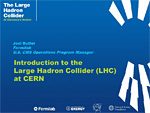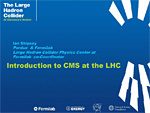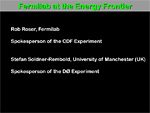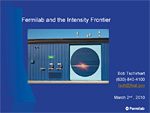Batavia, Ill. – The Large Hadron Collider at CERN in Geneva, Switzerland has reached record-breaking energies, but that doesn’t mean it’s time to close up shop at the Department of Energy’s Fermi National Accelerator Laboratory. Find out what’s next for the premier particle physics laboratory in the U.S. and get your LHC questions answered at a two-hour Q&A session with LHC and Fermilab scientists on Tuesday, March 2, from 1-3 p.m. in Wilson Hall. Reporters will also have the opportunity to tour the LHC Remote Operations Center at Fermilab.
In November 2009, scientists in Geneva, Switzerland restarted the LHC at CERN. In the days that followed, the LHC recorded its first particle collisions and accelerated the beams to an energy of 1.18 TeV, breaking the previous world record of .98 TeV Fermilab had held since 2001. In the coming weeks , LHC scientists will accelerate the beams to 3.5 TeV, creating collisions with a total of 7 TeV of energy. These high-energy collisions will mark the beginning of “first physics” at the LHC.
At the Q&A session on March 2, scientists will answer questions about the LHC and what it means for the future of Fermilab. Topics of discussion will include: first results from the LHC; what the first results will mean for Fermilab’s Tevatron collider; and future plans for Fermilab.
The LHC is the largest and most powerful particle accelerator ever built. It operates in a circular 17-mile tunnel about 300 feet underground between Switzerland’s Lake Geneva and France’s Jura mountains. More than 1,700 scientists in the U.S. participate in the LHC experiments. The Department of Energy and the National Science Foundation have contributed a total of $531 million to the construction of the detectors and accelerator over 12 years.
Reporters planning to attend the Q&A session on March 2 should contact Elizabeth Clements ( lizzie@fnal.gov or 630-399-1777) by Feb. 26. Fermilab will provide a call-in number to interested reporters who cannot attend the Q&A session in person.
Fermilab is a Department of Energy national laboratory operated under contract by the Fermi Research Alliance, LLC. The DOE Office of Science is the single largest supporter of basic research in the physical sciences in the nation and helps ensure U.S. world leadership across a broad range of scientific disciplines.
Media Briefing: Large Hadron Collider orientation and Fermilab’s future plans
-
Joel Butler, Fermilab, U.S. CMS Operations Program Manager
Watch video
Download slides
-
Ian Shipsey, Purdue University, co-coordinator for the LHC Physics Center at Fermilab
Watch video
Download slides
-
Rob Roser, Fermilab, CDF spokesperson
Stefan Soldner-Rembold, DZero spokesperson
Watch video
Download slides
-
Bob Tschirhart, Fermilab, Computing Division Associate Head for Future Programs and Experiments
Watch video
Download slides




